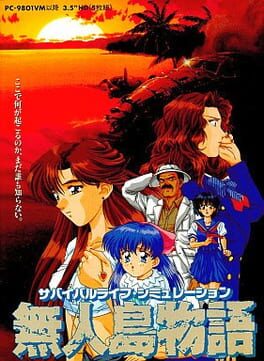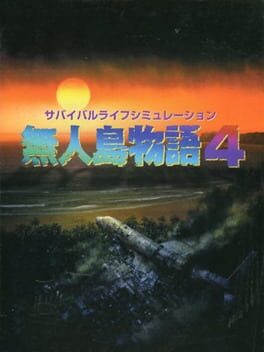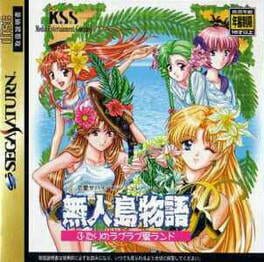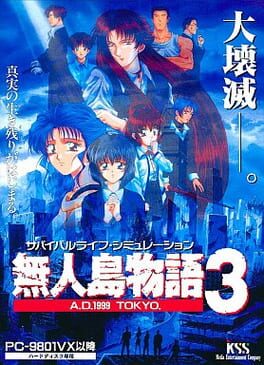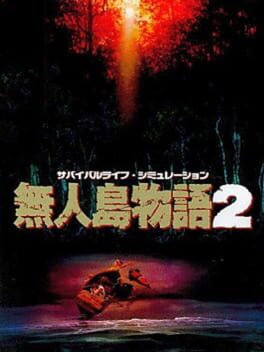

Mujintou Monogatari is a Strategy game, developed by Open Sesame and published by KSS, which was released in Japan in 1996.
Also in series
Reviews View More
Six unlucky victims of a plane crash somewhere in the Pacific Ocean. One island full of hunger, secrets, indigenous peoples, and more. No rescue in sight—just the hope of salvaging the wreckage and radioing for any help out there, or somehow completing one of a few viable vehicles to escape in. It's a rough life, surviving on a deserted island leagues away from home, but Mujintou Monogatari (or "Deserted Island Story") livens up this cute Crusoe-de with raising sim tropes and an optimistic aesthetic. Years before the Survival Kids and Lost in Blue series (plus The Sims 2: Castaway Life!), KSS & Open Sesame produced one of classic Japanese PC gaming's best strategy adventures, and I've played enough to say that with confidence. Its lack of exposure and fan translation, even within the PC-98's Anglosphere fandom, saddens me.
| Marooned in Blue |
The story begins like any good disaster movie: a Boeing passenger jet drifts through stormy weather, doing fine until its systems fail for some reason. With pilots scrambling to avert the worst and the civilians on-board panicking at their descent, it's a small miracle that the player-named protagonist awakens intact on a sunny summer beach. Guiding our high-school boy across the coast, we bump into a motley band of castaways: young and precocious Ayase,girlboss sophisticated flight attendant Erina, overbearing but helpful team dad "Professor", talented college-level computer diva Rika, and dependable tomboy student Saori. Teamwork ensues! They set up a simple shack, promise to put aside their misgivings and differences, and set about collecting the food, water, tools, and know-how to thrive here and eventually return home. As I mentioned earlier, this involves drafting plans (blueprints, in fact) for a few potential vessels, from a sail-less boat to a MFing zeppelin! Story scenes happen as you explore more of the island, earn enough trust with your co-habitants, and inch ever closer to the fateful day.
Where to begin with all the systems Mujintou Monogatari throws at you? The game largely revolves around a top-down view of your current location, usually the beach camp where you'll need to return to for rest and planning. Moving the cursor's pretty much required, some hotkeys aside, as you select commands from a sidebar and then many deliciously decorated menus. KSS wisely avoided any minigames or sequences revolving around reflexes, let alone the typically awkward numpad key controls of contemporary PC-X8 software. Instead, players just have to manage a wide variety of stats, both for characters and the camp's resources. Collecting potable water and fruits becomes a daily ritual, even for the exhausted. Raw materials needed to craft even basic tools, like machetes and rope, require extensive forays into the jungles, streams, and plains of this seemingly untamed land. Everyone can build up new and current skills over time, but at the cost of temporarily lower yields or wrecking someone's mental state. It's the kind of careful juggling act you'd expect from Princess Maker 2, with just as many variables for thankfully more predictable outcomes.
| Deserted Island Foibles |
Unlike in Gainax's iconic raising sim series, though, KSS and the developers offer more plot and cast interactions to maintain the opening's strong pacing. For example, I met the island's major tribe a bit before halfway through the game, a pleasant encounter with locals just as curious about us as we are about them. The Professor gets giddy at the sight of seemingly unexplored ruins; Erina struggles to adapt to a life without Western amenities; Ayase and Saori both vie for the title of Genki Girl, if only to mask their loneliness; and an aloof Rika, seemingly the most capable of the bunch, confides her self-doubt with the protagonist she's starting to fall for. There's enough crisscrossing threads and details that the often repetitive tasks and ventures into unknown territory remain intriguing. As the player nears any of the endings they're pursuing, Mujintou Monogatari also starts to probe interesting ideas—mainly the discomfort of both living here and soon having to depart and leave this tight-knight, caring group of people. Additional interludes like a drunken going-away party (which the whole band participates in, concerningly), plus evidence of WWII-era Imperial presence on the island via a long marooned serviceman, enrich the narrative.
All this gets reinforced in the game loop itself, as you must set up search parties with each person's compatibility in mind. Pair the wrong two characters up and they'll fail spectacularly! On the flipside, smart combinations can lead to discovering secret areas or items earlier, and these dynamic duos also do better at item crafting. Almost every aspect here conveys the importance of communication, compromise, and cooperation in desperate circumstances. The group hardly avoids conflict, but they work through these ups-and-downs in a naturalistic manner, which matches the occasionally silly but serious tone of the story. And this really helps because Mujintou Monogatari, though not brutally hard, is still a demanding piece of software. Players have to not just understand the island, its residents, and where you can forage from, but they also need to raise the "civilization" rating back at camp to progress further.
Crafting becomes increasingly important even before you've fully mapped out the island, and it's the clunkiest system for sure. Every team member can equip various items to aid in exploration, most of which are only accessible after checking out enough hotspots or surveying a given range of the wilderness. Once you've found key items in the wild and added them to a ramshackle crafts shop, then the manufacturing can commence! This involves a lot of less-than-satisfying fiddling around in menus, flipping between screens to assess resources needed for creation vs. what's available at the moment. Still, this spate of poor user interface design didn't bother me for too long. Arguably the trickiest section in this game is the opening hour itself since you've only got a lifeboat's worth of rations and liquids to work with. Moving quick and taking a few risks early on pays off.
| All the Pretty Sights |
Beyond how well it plays and immerses one in this torrid scenario, Mujintou Monogatari has lush, memorable audiovisuals and style to accompany players through their journey. I think people had to work harder than usual to make an ugly PC-98 pixel art experience, and KSS certainly succeeds at visualizing a gorgeous, inviting tropical realm. So many UI windows, land textures, and background CGs pop out in their 640x400 resolution glory, working with the platform's system rather than against. Maybe the music could have been catchier or better developed to match, but it's still a nice set of tunes, ranging from poppy marches to pensive background orchestration. A lot of people clamor to these mid-'90s "aesthetic" PC-X8 adventures and xRPGs for the character designs, among otheroften pervy reasons. I'm glad to report that the characters here are distinctive and as fashionably dressed as expected from the genre; illustrator VOGUE renders all the men, women, and woodland critters in glittering detail, yet still portrays them in dirty and less flattering situations without issue. So much thought clearly went into how the game looks, sounds, and portrays its subjects, more than I'd expect from a '94 raising sim targeting a largely male otaku audience.
And that's another area in which this excels: a general lack of pandering to any one market. There's a couple raunchy moments (yes, there's the Obligatory Hot Springs Episode), and something of a romance towards the end with one of the leading ladies, but it's tame compared to even KSS' other raising sims back then. We're far from blatantly erotic Wrestle Angels or sussy Princess Maker stuff, for better or worse. Sequels to Mujintou Monogatari would dabble with more fanservice, sure, but it wasn't until Mujintou Monogatari R and then a separate 18+ series that KSS and the remaining developers settled for easy money. The original game acquits itself nicely, balancing the occasional red meat for otaku gamers with no-nonsense, respectful treatment of each heroine's agency and complex characterization. (It's kind of weird how the Professor gets the least development here despite his age, but at least he's not just an oji-san stereotype played for laughs. Cold comfort, I guess.) I'd hesitate to deem this entirely wholesome, yet I'd be more justified in recommending this to anyone curious about PC-98 ADV/proto-VN soft than, well, a bit under half the commercial library which sits firmly in NSFWville.
KSS had found a strong niche by '94 thanks to intimidating but rewarding sims like Mujintou Monogatari, and they wouldn't be going anywhere awful for years to come. They remained one of the last well-balanced publishers releasing PC-98 exclusives into its waning years, and their exploits on Sony's ascendant PlayStation proved even more fruitful. While the first sequel to this desert-island fantasy largely reused the premise and tried out a different set of tropes, Mujintou Monogatari 3: A.D. 1999 transplanted the gather-craft-escape format to an earthquake-ravaged Tokyo, evoking the majesty and it-can-happen-here horrors of kaiju media and certainly the '95 Kobe quakes from that period. Sadly, like many once acclaimed but overlooked Japanese PC game franchises, this one ended up in the easy-horny pit, a victim of cash-grabs and hastily made ero-anime from KSS' own in-house animation firm, Pink Pineapple. Let's not allow that to become the legacy of this obscure series out West. Rather than settle for that or the downgraded (though admirable) Super Famicom port, I hope communities like this endeavor to try out and appreciate the PC-98 original, and ideally get some fan translators interested. Mujintou Monogatari earned a kind of prestige few other sims on the system could, hence its console successors, and it'd be a shame if this didn't get the historic reappraisal it deserves.
| Marooned in Blue |
The story begins like any good disaster movie: a Boeing passenger jet drifts through stormy weather, doing fine until its systems fail for some reason. With pilots scrambling to avert the worst and the civilians on-board panicking at their descent, it's a small miracle that the player-named protagonist awakens intact on a sunny summer beach. Guiding our high-school boy across the coast, we bump into a motley band of castaways: young and precocious Ayase,
Where to begin with all the systems Mujintou Monogatari throws at you? The game largely revolves around a top-down view of your current location, usually the beach camp where you'll need to return to for rest and planning. Moving the cursor's pretty much required, some hotkeys aside, as you select commands from a sidebar and then many deliciously decorated menus. KSS wisely avoided any minigames or sequences revolving around reflexes, let alone the typically awkward numpad key controls of contemporary PC-X8 software. Instead, players just have to manage a wide variety of stats, both for characters and the camp's resources. Collecting potable water and fruits becomes a daily ritual, even for the exhausted. Raw materials needed to craft even basic tools, like machetes and rope, require extensive forays into the jungles, streams, and plains of this seemingly untamed land. Everyone can build up new and current skills over time, but at the cost of temporarily lower yields or wrecking someone's mental state. It's the kind of careful juggling act you'd expect from Princess Maker 2, with just as many variables for thankfully more predictable outcomes.
| Deserted Island Foibles |
Unlike in Gainax's iconic raising sim series, though, KSS and the developers offer more plot and cast interactions to maintain the opening's strong pacing. For example, I met the island's major tribe a bit before halfway through the game, a pleasant encounter with locals just as curious about us as we are about them. The Professor gets giddy at the sight of seemingly unexplored ruins; Erina struggles to adapt to a life without Western amenities; Ayase and Saori both vie for the title of Genki Girl, if only to mask their loneliness; and an aloof Rika, seemingly the most capable of the bunch, confides her self-doubt with the protagonist she's starting to fall for. There's enough crisscrossing threads and details that the often repetitive tasks and ventures into unknown territory remain intriguing. As the player nears any of the endings they're pursuing, Mujintou Monogatari also starts to probe interesting ideas—mainly the discomfort of both living here and soon having to depart and leave this tight-knight, caring group of people. Additional interludes like a drunken going-away party (which the whole band participates in, concerningly), plus evidence of WWII-era Imperial presence on the island via a long marooned serviceman, enrich the narrative.
All this gets reinforced in the game loop itself, as you must set up search parties with each person's compatibility in mind. Pair the wrong two characters up and they'll fail spectacularly! On the flipside, smart combinations can lead to discovering secret areas or items earlier, and these dynamic duos also do better at item crafting. Almost every aspect here conveys the importance of communication, compromise, and cooperation in desperate circumstances. The group hardly avoids conflict, but they work through these ups-and-downs in a naturalistic manner, which matches the occasionally silly but serious tone of the story. And this really helps because Mujintou Monogatari, though not brutally hard, is still a demanding piece of software. Players have to not just understand the island, its residents, and where you can forage from, but they also need to raise the "civilization" rating back at camp to progress further.
Crafting becomes increasingly important even before you've fully mapped out the island, and it's the clunkiest system for sure. Every team member can equip various items to aid in exploration, most of which are only accessible after checking out enough hotspots or surveying a given range of the wilderness. Once you've found key items in the wild and added them to a ramshackle crafts shop, then the manufacturing can commence! This involves a lot of less-than-satisfying fiddling around in menus, flipping between screens to assess resources needed for creation vs. what's available at the moment. Still, this spate of poor user interface design didn't bother me for too long. Arguably the trickiest section in this game is the opening hour itself since you've only got a lifeboat's worth of rations and liquids to work with. Moving quick and taking a few risks early on pays off.
| All the Pretty Sights |
Beyond how well it plays and immerses one in this torrid scenario, Mujintou Monogatari has lush, memorable audiovisuals and style to accompany players through their journey. I think people had to work harder than usual to make an ugly PC-98 pixel art experience, and KSS certainly succeeds at visualizing a gorgeous, inviting tropical realm. So many UI windows, land textures, and background CGs pop out in their 640x400 resolution glory, working with the platform's system rather than against. Maybe the music could have been catchier or better developed to match, but it's still a nice set of tunes, ranging from poppy marches to pensive background orchestration. A lot of people clamor to these mid-'90s "aesthetic" PC-X8 adventures and xRPGs for the character designs, among other
And that's another area in which this excels: a general lack of pandering to any one market. There's a couple raunchy moments (yes, there's the Obligatory Hot Springs Episode), and something of a romance towards the end with one of the leading ladies, but it's tame compared to even KSS' other raising sims back then. We're far from blatantly erotic Wrestle Angels or sussy Princess Maker stuff, for better or worse. Sequels to Mujintou Monogatari would dabble with more fanservice, sure, but it wasn't until Mujintou Monogatari R and then a separate 18+ series that KSS and the remaining developers settled for easy money. The original game acquits itself nicely, balancing the occasional red meat for otaku gamers with no-nonsense, respectful treatment of each heroine's agency and complex characterization. (It's kind of weird how the Professor gets the least development here despite his age, but at least he's not just an oji-san stereotype played for laughs. Cold comfort, I guess.) I'd hesitate to deem this entirely wholesome, yet I'd be more justified in recommending this to anyone curious about PC-98 ADV/proto-VN soft than, well, a bit under half the commercial library which sits firmly in NSFWville.
KSS had found a strong niche by '94 thanks to intimidating but rewarding sims like Mujintou Monogatari, and they wouldn't be going anywhere awful for years to come. They remained one of the last well-balanced publishers releasing PC-98 exclusives into its waning years, and their exploits on Sony's ascendant PlayStation proved even more fruitful. While the first sequel to this desert-island fantasy largely reused the premise and tried out a different set of tropes, Mujintou Monogatari 3: A.D. 1999 transplanted the gather-craft-escape format to an earthquake-ravaged Tokyo, evoking the majesty and it-can-happen-here horrors of kaiju media and certainly the '95 Kobe quakes from that period. Sadly, like many once acclaimed but overlooked Japanese PC game franchises, this one ended up in the easy-horny pit, a victim of cash-grabs and hastily made ero-anime from KSS' own in-house animation firm, Pink Pineapple. Let's not allow that to become the legacy of this obscure series out West. Rather than settle for that or the downgraded (though admirable) Super Famicom port, I hope communities like this endeavor to try out and appreciate the PC-98 original, and ideally get some fan translators interested. Mujintou Monogatari earned a kind of prestige few other sims on the system could, hence its console successors, and it'd be a shame if this didn't get the historic reappraisal it deserves.
